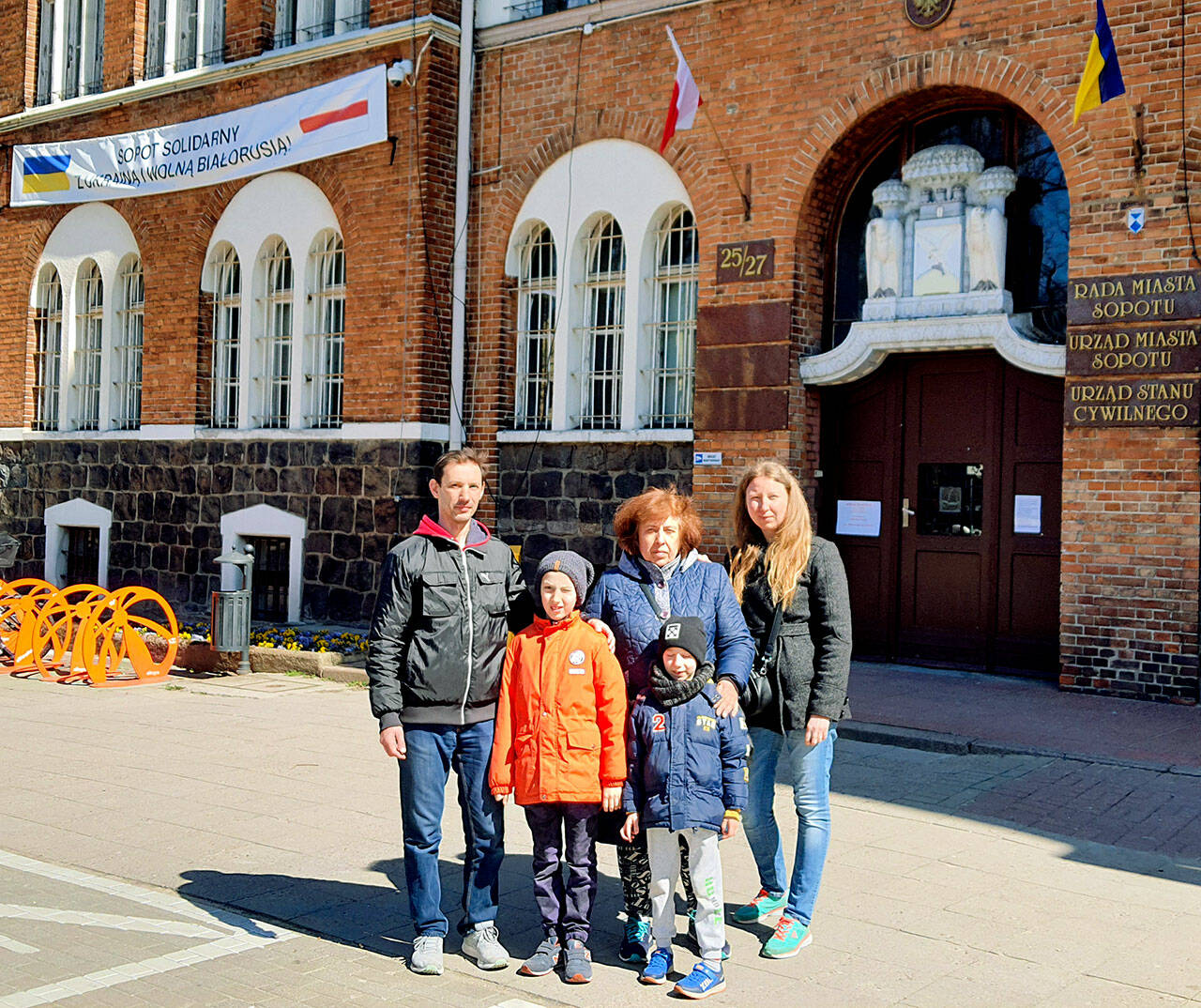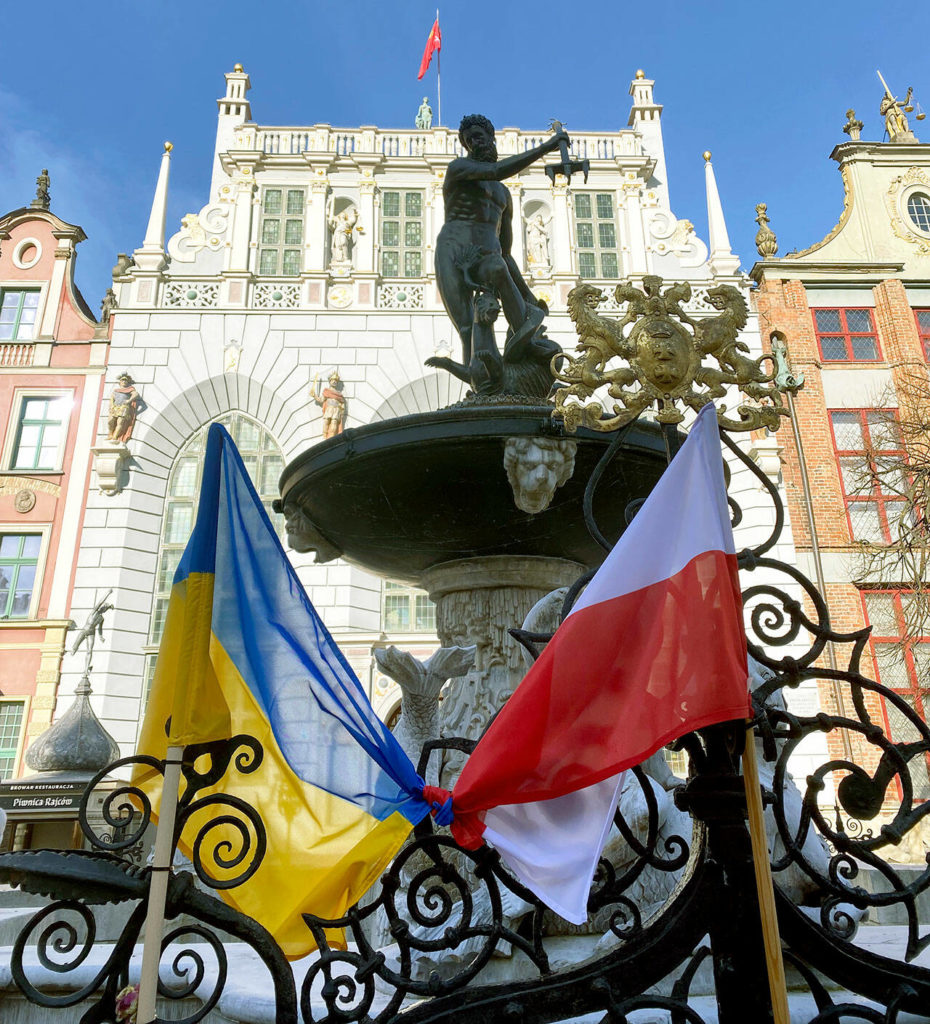By Yuliya Wold / Special to The Herald
Eight days after Russia invaded Ukraine, I flew to Poland to find my family.
On Feb. 24, they awoke at 5 a.m. to explosions and children screaming outside their Odessa home. Overnight, our country became an active war zone. My mom, my sister, her husband and their two young boys evacuated Ukraine shortly thereafter.
I didn’t know where my family was going to be, but I couldn’t sit on the sidelines. As they attempted to cross the Poland-Ukraine border on March 3, I bought a plane ticket from Seattle to Warsaw that same day.
I was born and raised in Odessa in the early 1980s, when Ukraine was still part of the Soviet Union. I first came to the United States to help Ukrainian orphans, then moved to Washington after graduating from Odessa State University.
I moved to Snohomish County in 2005 and became a U.S. citizen three years later. In 2011, I joined the Everett Police Department. As a police officer, I can give back to the same community that provided me with so many opportunities when I first arrived.
In 2014, when Russia invaded and illegally annexed Crimea from Ukraine, my sister and I decided to petition for her family to immigrate to the United States. It’s a process where I become a sponsor to ensure she and her family do not become a “public charge,” meaning primarily dependent on the government for subsistence.
I wanted to make sure my sister, an English teacher, and her husband, a business owner making custom cabinets, could provide a safe environment for their sons.
That reunification process was still pending with the U.S. Citizenship and Immigration Services when Russian President Vladimir Putin launched a full-scale attack on Ukraine in February.
I convinced my family to take any chance they had — while maintaining their safety — to evacuate to Poland. I feared that Odessa, being the third-largest city in Ukraine and a key port city on the Black Sea, was not going to be spared from Russian atrocities.
As the war went on, this fear proved to be substantiated. Odessa has since experienced several civilian casualties — including a three-month-old baby girl killed in a missile strike by Russian forces — as well as a record number of 11 air raid warnings in a single day on May 7.
While my mom, sister and her family left Odessa, my 85-year-old grandmothers both chose to stay due to their age. It was a heartbreaking decision for our family.
My grandmothers were young girls during World War II, so they have vivid memories of when the Nazis occupied Soviet Ukraine. My grandma on my father’s side is Jewish and a Holocaust survivor who hid from the Nazis from age four to nine. Eighty years later, my grandmothers must hide again, this time in bomb shelters as their home country is attacked once more.
In early March, my family set out on an arduous journey in the hopes they’d make it to Poland, taking multiple trains and buses, and traveling by foot. The border crossing wait time was over 12 hours.
No one complained. They knew they were the “lucky ones.”
Thousands were packed in overcrowded evacuation trains that appeared like ghost rides: Any identification markings on them were removed, the windows draped over and shut, traveling in complete darkness so as to not attract attention.
There was no such thing as a “safe humanitarian corridor,” as Russian soldiers were known to bomb the routes and any infrastructure standing in their way.
After three days, my family made it. They traveled from Przemysl to Krakow, then to Warsaw and eventually ended up in Sopot, a beautiful town on the Baltic Sea. I was so relieved they were in a NATO country.
My mom said the kindness, positivity and encouragement of volunteers they met along the way was unbelievable. My family didn’t speak a word of Polish, but they were assisted every step of the way by the Polish people.
I arrived in Poland on March 5. When I arrived at the Central Train Station in Warsaw, the magnitude of the war hit me. Millions of my fellow Ukrainians were suddenly refugees. I saw mostly women and children, many with few belongings, resting on the floor. Russian and Ukrainian conversations filled the air. Volunteers wore vests that listed the languages they spoke, and they helped people navigate transportation, housing, food and other necessities.
The scene was surreal, like I was watching it all on a loop through a virtual reality headset that I couldn’t take off. I was witnessing — in real time — the forced displacement of an entire generation of Ukrainian youth.
I left for Sopot on a train from Warsaw and finally reunited with my family at a hotel the local government had placed them in. I don’t think I had ever hugged them as tight as I did the moment I saw them.
My two nephews — Artem, 9, and Yehor, 5 — were quick to show me all the toys the Polish volunteers showered them with. I rented a room in the same hotel and spent the next six weeks with my loved ones and other refugee families, helping them with paperwork, resources and translation.
I met many refugees, including Makar, a 4-year-old boy who evacuated to Poland with his two siblings, parents and grandparents. When I asked him what city he was from, Makar didn’t hold back. He told me he was from Lviv and that his family left because of the sirens and scary bombs.
Having raised two boys of my own, I thought I was decent at carrying on a conversation with little kids. However, I was completely unprepared to talk to a 4-year-old about bombs, fears and sirens.
The sirens. I heard that word from so many Ukrainian children. I witnessed the fear in my own nephews when we stepped outside to go to a store and a loud siren went off in the distance. It had come from a fast-approaching ambulance, but the boys physically shook and looked at their mom. The oldest, Artem, asked if “those are the good sirens,” with a panic-stricken look on his face.
In their eyes, I saw the trauma of not only the sudden change in their environment, but also the sounds, smells and fallouts from the war-torn home they left behind.
The conversations with Yehor, my youngest nephew, ranged from the routine, “What did you have for breakfast?” to him asking me in great detail about what being a police officer was like — those “did you ever …?” questions that boys his age typically ask.
As he got more comfortable, Yehor started telling me about the sirens and the war.
“I want all Russians to go live on the sun,” he told me. I was baffled and asked if he meant Mars.
“No, the sun,” Yehor said, “so they can all burn there.”
I was speechless. I explained as best as I could that not all Russians were bad and that many go to prison for speaking out against the war. My sister made it a point not to discuss the war or have the news on in front of the kids. Still, it was excruciating to witness this tiny human being experiencing so much hurt inside.
But there were good moments, too. Glimmers of humanity. I met Anya, a single mother, and her daughter, Masha, at the hotel. They had escaped from Luhansk, an eastern city in the Donbas region. Masha turned 5 just two days after I arrived.
She celebrated her birthday with two dozen strangers who were mostly refugees. We surrounded a table where Masha sat in front of her strawberry cake, bought by Polish volunteers. I don’t think I ever sang a “Happy Birthday” song with as much meaning, pain and fear for the future of this little girl.
My two nephews proudly presented her with a set of colorful hair ties they found in a secondhand donation bin. Masha was so happy and carefree. I saw tears in her mother’s eyes.
I’m certain neither of them planned to have a birthday party surrounded by strangers in a foreign country. And though they couldn’t speak Polish, they felt so much love that no language was necessary.
Later that afternoon, Polish volunteers invited Masha and other refugee children to take a horse-riding lesson. Happy and a bit fearful, the kids worked up the courage to feed and pet the horse, and then ride him. Watching little humans take on the overhaul of their entire existence with such resiliency was empowering.
After three weeks at the hotel, my family was moved to a dorm that housed 400 Ukrainian refugees. My family of five occupied the same tiny room. They were very grateful to be safe and have been in that dorm for over two months. Finding a reasonably priced rental wasn’t feasible: Not only did Poland’s population suddenly grow by over 2 million Ukrainians, effectively leaving vacant apartments in short supply, but many refugees lacked a source of income.
I attempt to communicate with my grandmothers daily. On many days I get no answer and later learn they were in a bomb shelter. Living with the air raid sirens alerting of an incoming missile strike is becoming a part of their daily life, their daily routine. It’s absolutely horrifying.
We don’t know when — or if — my family and millions of other Ukrainians will be able to return to their home country. The infrastructure is gone. Thousands of civilians have been killed. And Russia’s naval blockade could “unleash an unprecedented wave of hunger and destitution” around the world, as Ukraine is a major grain exporter, according to Secretary-General Antonio Guterres. The war continues.
I was recently approved as a sponsor for my family by the USCIS for a new program called “Uniting for Ukraine.” It would allow me to bring my family to the United States for two years on a humanitarian parole basis.
My mother, sister and her sons were approved immediately for travel authorizations. But her husband, who is from Azerbaijan and has permanent residency in Ukraine, was still waiting for his more than a month after applying. They were grappling with potentially separating as a family, as their travel authorizations were set to expire in two months.
But on June 10, I received the best news: My brother-in-law finally received his travel authorization. I immediately bought my family plane tickets. They fly in to Washington on June 23, just in time for warmer, sunnier days ahead.
It may seem like a little victory, but for me it feels like the whole world just became real in bringing them here. They’ve been in Poland — away from home — for almost four months. They’ve earned it to be with family and away from the explosions, the fires, the sirens.
As I told my sister the date they fly out, I could hear Artem in the background excitedly ask, “How many more sleeps is that?”
He counted the nights until their departure, and exclaimed, “Twelve! Twelve more sleeps!”
Editor’s note: This story was compiled and edited by Herald writer Taylor Goebel.
Talk to us
> Give us your news tips.
> Send us a letter to the editor.
> More Herald contact information.



























